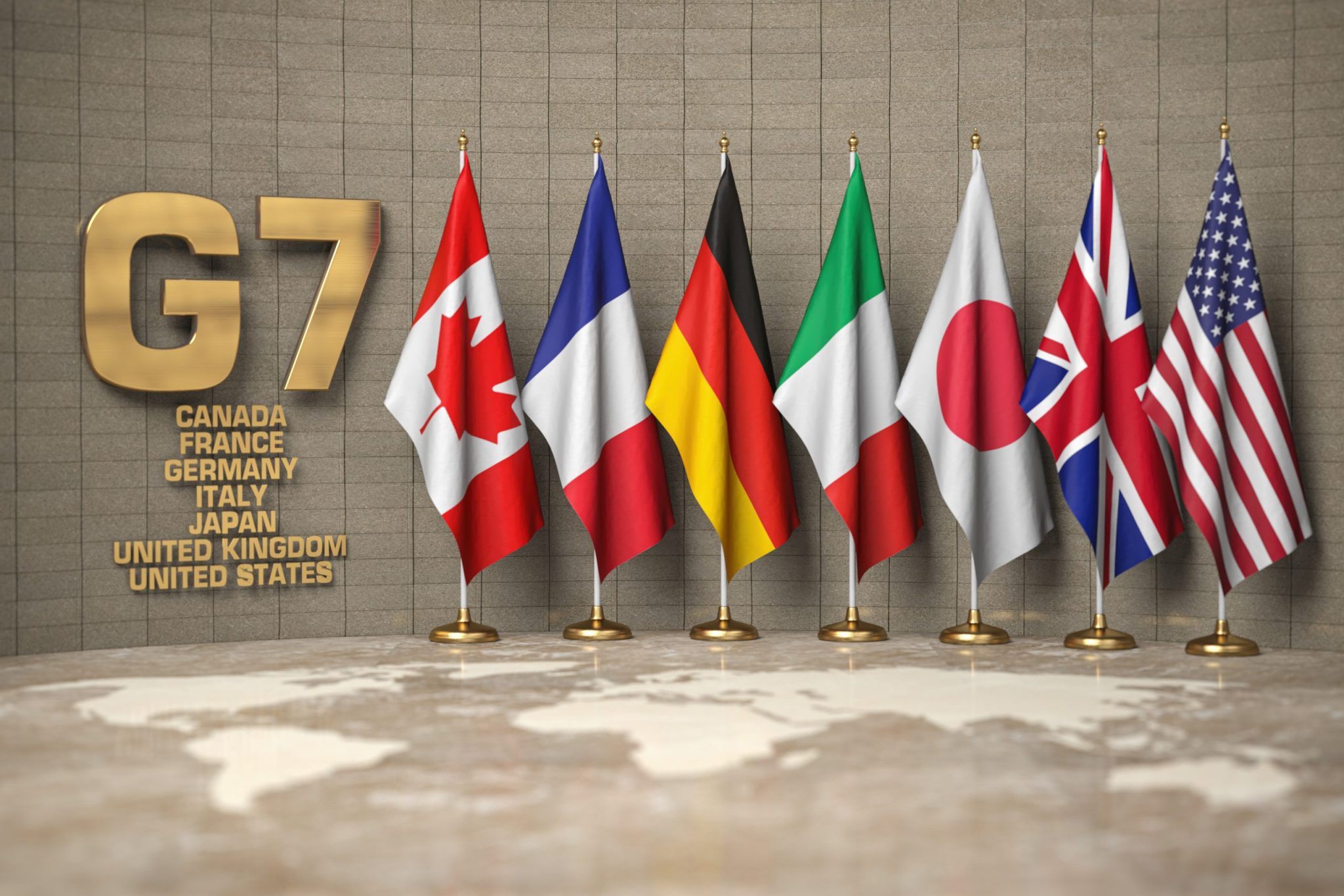At the beginning of 2023, Japan assumed the presidency of the Group of Seven (G7) from Germany. This puts Tokyo, already a prime target of Chinese information manipulation, at the helm of a body that has drawn significant and sustained criticism from Chinese diplomats and state media over the past 14 months. The recurring narratives promoted by Beijing during that period provide an indication of what Japan should look out for over the coming year.
A Sense of Scale
Between January 1, 2022 and March 1, 2023, Chinese diplomatic and state media Twitter accounts monitored on the Hamilton 2.0 dashboard tweeted about the G7 more than 2,300 times, including retweets and quote tweets. (This total is likely an undercount due to false negative resulting in exact match searches being used for “G7” and “G7’s” to avoid false positives resulting from tweets where “G7” appeared as part of a URL string.) The ten accounts that tweeted the most about the G7 included many of China’s most hawkish commentators, including the consul general in Belfast, Zhang Meifang, Pakistan-based diplomat Zhang Heqing, and the head of China Daily in Europe, Chen Weihua.
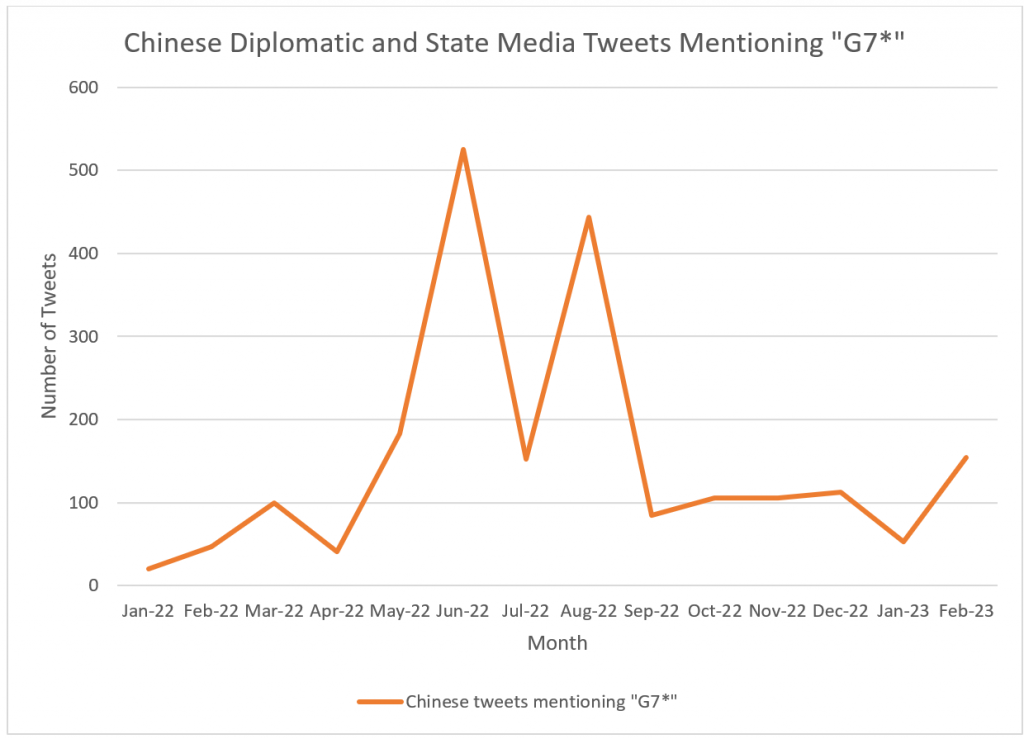
Chinese diplomatic and state-backed media tweets mentioning “G7*” between January 1, 2022 and March 1, 2023.
But the diplomat/government official that was most active in tweeting about the G7 was the consul general in Osaka, Japan, Xue Jian. Jian has tweeted about the G7 135 times over the past 14 months; although, all but four of those tweets were retweets or quote tweets. Of those tweets, the 20 most engaged-with portrayed the grouping in a negative manner.
During the studied period, Japan was the third most mentioned member state of the G7 after the United States and Germany. (It ranked fourth when including mentions of the EU, a “non-enumerated” member.) It was mentioned far less than non-member states China, Ukraine, and Russia, and slightly less than Taiwan. Japan was a particular focus of Chinese tweets about the G7 in August 2022 when China cancelled top level meetings with Japan over the G7’s statement surrounding then-Speaker of the US House of Representatives Nancy Pelosi’s trip to Taiwan. Mentions of Japan in relation to the G7 have spiked again in 2023, which likely represents a new normal now that Japan is heading the grouping.
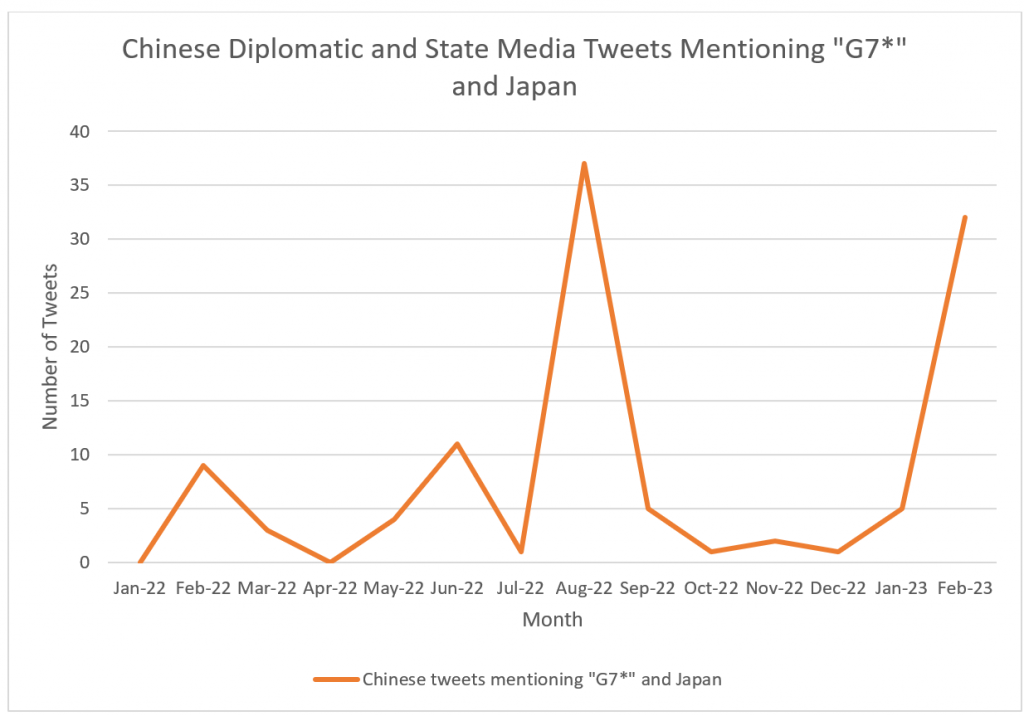
Chinese diplomatic and state-backed media tweets mentioning “G7*” and Japan between January 1, 2022 and March 1, 2023.
No Love Lost
China’s coverage of the G7 during the studied period was overwhelmingly negative. In fact, an analysis of the 50 most engaged-with tweets from Chinese diplomats and state media that referenced the G7 found that all were critical of the group. The most prominent narrative in those tweets was that the G7 is an unrepresentative body with a dwindling influence in world affairs.
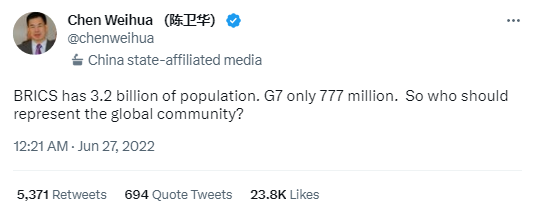
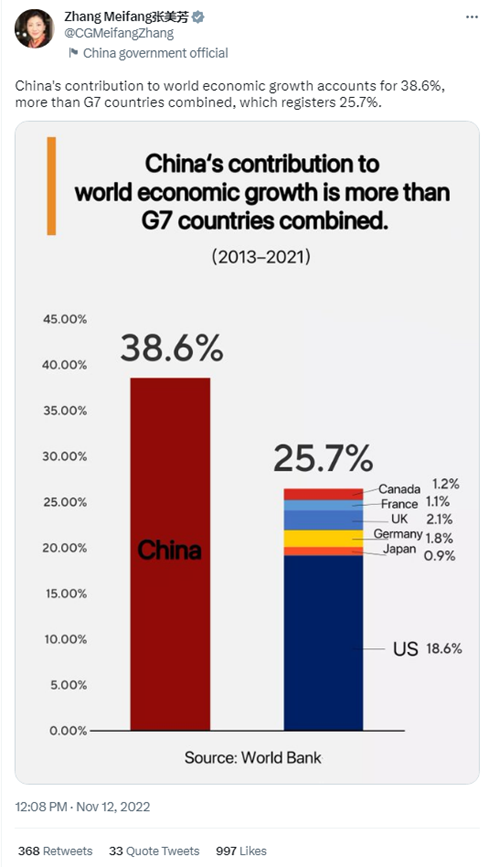
Chinese rhetoric about the grouping was also steeped in anti-colonial rhetoric and imagery that built upon China’s own historical resentment toward certain G7 members. For instance, in August 2022, Assistant Foreign Minister Hua Chunying portrayed the group’s members as “imperialist powers”, and then-Ministry of Foreign Affairs spokesperson Zhao Lijian posted a meme that echoed an infamous 1898 cartoon denouncing colonialism. The modern reimagining of the cartoon left out Japan, although it featured prominently in the original.
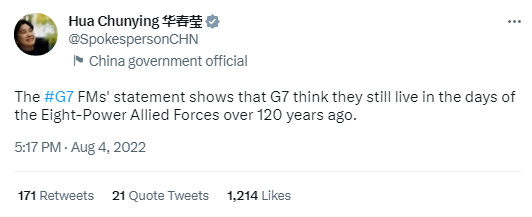
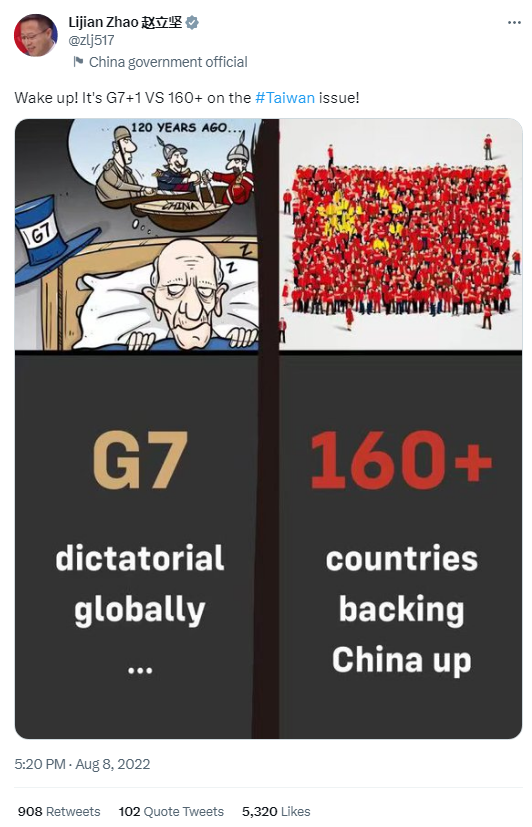
Divide and Conquer
Indeed, Japan’s participation in the G7 doesn’t neatly fit into the Chinese narrative that it is an exclusively Western club with racist undertones. But throughout 2022, both Chinese diplomats and state media commentators regularly presented Tokyo as a “second-class” participant that was somehow afforded less consideration than the other members of the group.
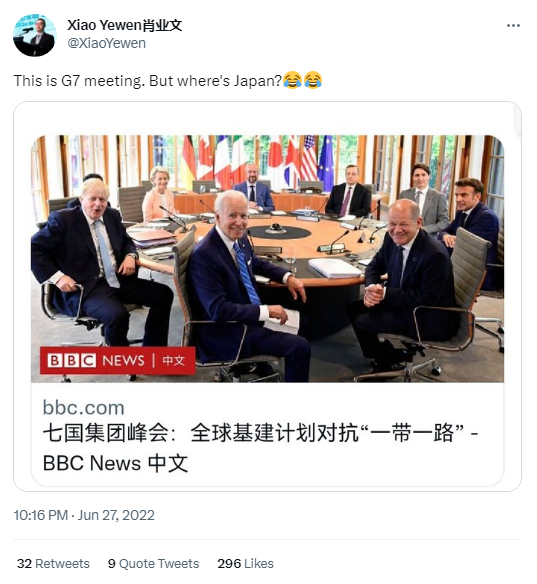
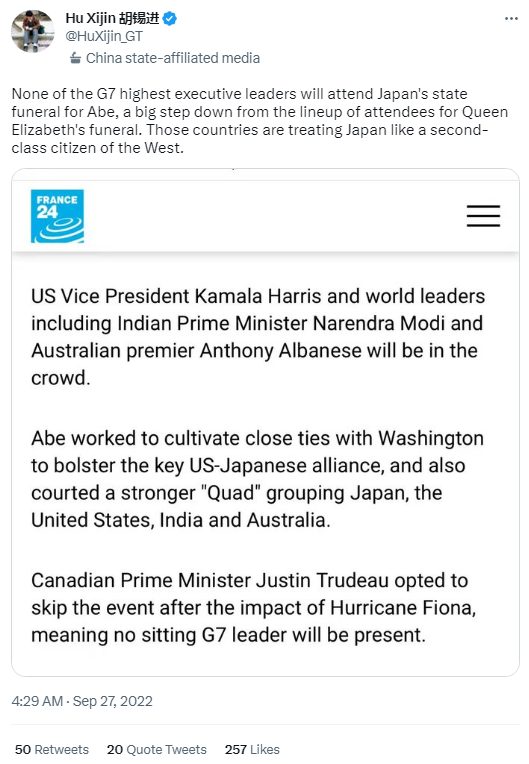
Chinese accounts also amplified content that emphasized how Japan is different from the other members of the G7; for example, content highlighted Japan’s refusal to follow the G7’s lead on cutting off Russian gas supplies and its ban on same-sex marriage. Both instances could be viewed as an effort by China to exploit social and political differences between Japan and its transatlantic partners to create cleavages within the group.
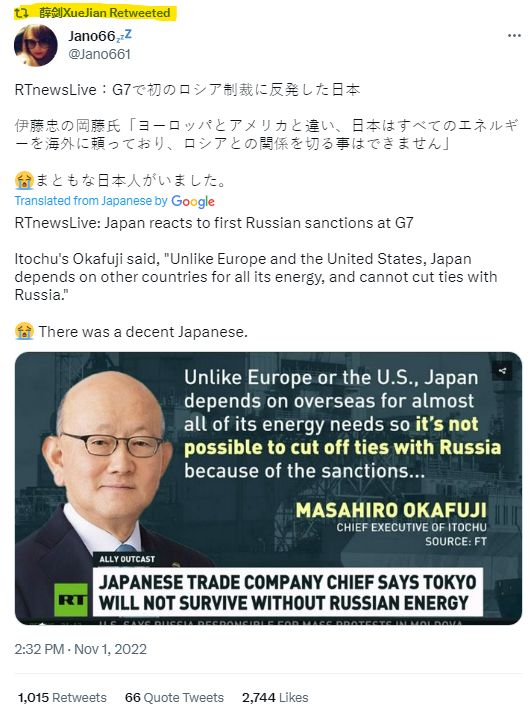
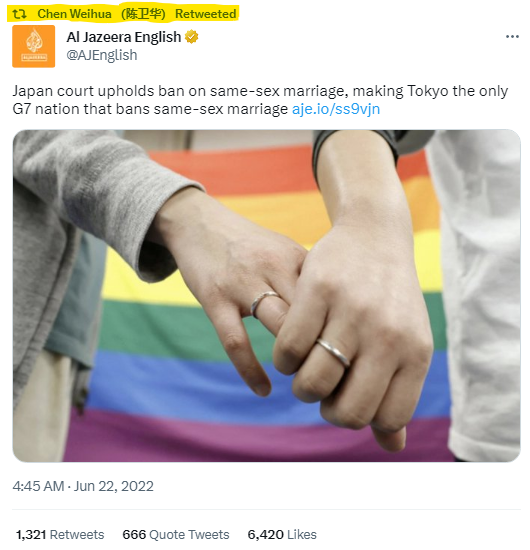
And for all the attempts to portray Japan as somehow less imperialistic than other G7 members, Chinese diplomats and state media alike routinely return to Japan’s World War II record when Tokyo’s actions don’t align with Beijing’s national interests.
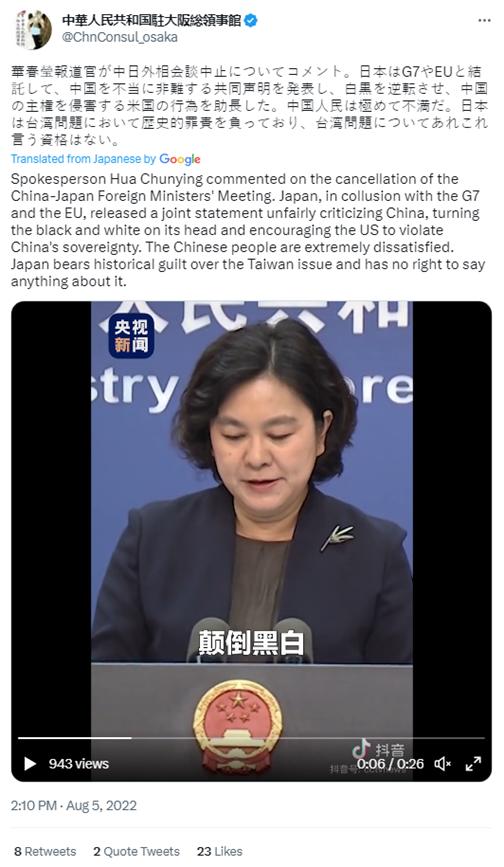
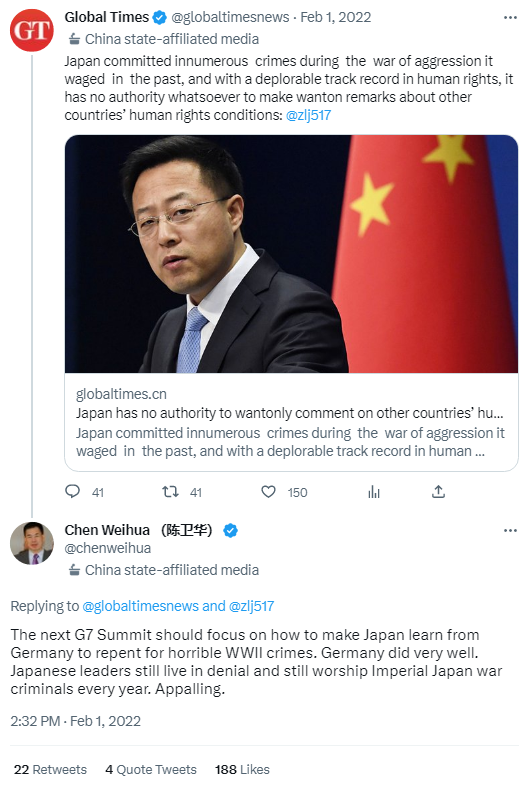
What’s Next
Both the G7 and Japan are frequent targets of Chinese information manipulation campaigns. In addition, Tokyo’s priorities at the helm of the grouping over the coming year, for instance sustaining unity toward Ukraine and securing its partners’ support over the release of Fukushima’s wastewater into the Pacific Ocean, do not align, and sometimes openly clash, with Beijing’s national interests. Therefore, it is likely that Chinese diplomats and state media will sustain, and even intensify, their efforts to drive a wedge between Japan and its G7 partners. It is important that Japan be proactive and build on existing G7 mechanisms, such as the Rapid Response Mechanism, to ensure that it comes out of this presidency better equipped to wage the global battle of narratives.
The views expressed in GMF publications and commentary are the views of the author alone.

